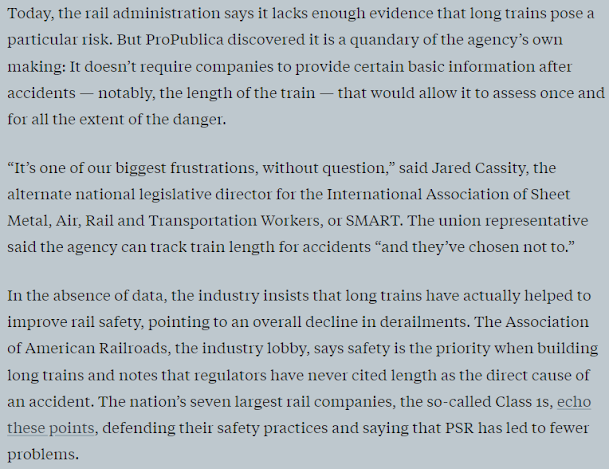TL;DR:
One way to avoid government regulation is by simply refusing to share data that may lead to government regulation (and safer trains). I'm looking at you, railroads.
_____________________________________________________________________________
Not every example I post syncs directly to the typical Psychological Statistics curriculum.
I also post about statistical literacy. Like why data matters and counts. And how very, very simple data could help illuminate and solve real-world problems, but only if we can access that data.
I get good and mad at organizations that avoid responsibility by manipulating and/or withholding data.
See: Organizations that share data but in a functionally inaccessible way. Also, I created a spreadsheet (of course I did) containing several examples of times when large organizations goofed around with data so they wouldn't get sued. It looks like I should add rail roads to this list.
Aside: I grew up not 10 miles from the world-famous Horseshoe Curve. This also means that I grew up in a city that had a railroad running through it (Hollidaysburg, PA), went to graduate school in a town with a railroad running through the middle of it (DeKalb, IL), and currently live in a city with a railroad track that runs through the middle (Erie, PA).
 |
| The world-famous Horseshoe Curve, y'all. |
I am proud of my hometown's railroading history. And pretty mad that railroads have made trains longer and longer over time but aren't compelled to report the length of trains when they are involved in accidents. Since the regulatory bodies don't have the data, they can't determine if long trains are causing accidents.
For a brief audio summary of this issue, here is the NPR interview with ProPublica's Dan Schwartz.
Check out Schwartz's report at ProPublica for a deep dive into this topic. Below, I included some screenshots from the ProPublica piece, but you should see the ProPublica piece itself. It contains lots of good graphics and more details about specific train accidents and the lives they have changed.
Schwartz highlights that there are ample reasons to believe that longer trains lead to more accidents. Trains and rails were not designed with super-long trains in mind. It seems reasonable to think that longer trains are problematic because of physics. Bigger things take longer to slow down. Railroad tracks and safety features were not designed with long trains in mind.
But regulatory agencies can't prove it BECAUSE THEY DO NOT DEMAND THAT SPECIFIC DATA POINT WHEN INVESTIGATING TRAIN ACCIDENTS.
 |
| https://www.propublica.org/article/train-derailment-long-trains |
Go to the original article. He explains the rise of the extra-long trains and how they have increased railroad profits.
Aside: ProPublica is a favorite of mine! Check out these past blog posts featuring their reporting...



Comments
Post a Comment